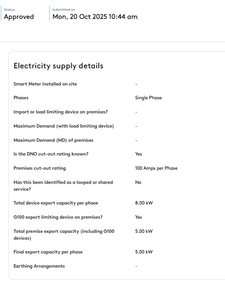Getting ready for export using 8kw solis and 16kwh seplos battery
So my plans when installing the 8kw solis and 16kwh seplos battery were not for export, just a protection for blackouts. And a first step to lower electricity expenses as they will only grow when we get an ASHP. Eventually we may add some PV.
The install is almost ready. 🙂
Now as ukpowernetworks stated will approve us to do 5kw export, taking the next step while it is all fresh seems simpler.
Octopus seems to accept export without MCS (as I had no plan to export now, I never got it from the electricians, not sure if they have it or not).
What are people's thoughts in terms of advantage to get the MCS paperwork vs setting up export to the utility operators that do not require it, is there much to gain?
And the simplest way to do it. As I have no questions about safety etc, the paper is the value.. 😉
8kW Solis S6-EH1P8K-L-PLUS hybrid inverter; G99: 8kw export; 16kWh Seplos Fogstar battery; Ohme Home Pro EV charger; 100Amp head, HA lab on mini PC
Maybe due to mine being a countercyclical application (when few folks think about PV), UK Powernetworks turned this around in less than a week.
8kW Solis S6-EH1P8K-L-PLUS hybrid inverter; G99: 8kw export; 16kWh Seplos Fogstar battery; Ohme Home Pro EV charger; 100Amp head, HA lab on mini PC
Is your installer MCS certified? If so, they should register the install and provide the paperwork for you.
Samsung 12kW gen6 ASHP with 50L volumiser and all new large radiators. 7.2kWp solar (south facing), Tesla PW3 (13.5kW)
Solar generation completely offsets ASHP usage annually. We no longer burn ~1600L of kerosene annually.
Posted by: @old_scientistIs your installer MCS certified? If so, they should register the install and provide the paperwork for you.
Agree, that is the route I also advise most to take.
In my case, I contacted an installer recommended by Fogstar. After a few calls, £3200 was estimated over the phone. Fair for a simple no PV system with an inverter with a type-tested certificate? By the way, the installers are still recommended...
8kW Solis S6-EH1P8K-L-PLUS hybrid inverter; G99: 8kw export; 16kWh Seplos Fogstar battery; Ohme Home Pro EV charger; 100Amp head, HA lab on mini PC
It seems that the electrically capable can go further on the G99 process. The G99 A3-1 and A3-2 form includes a checklist of safety aspects for the "site" and the grid.
Safety is key, always consult an electrician.
Credit to @transparent and other pioneers that made this journey a lot more accessible, like with last year's post.
8kW Solis S6-EH1P8K-L-PLUS hybrid inverter; G99: 8kw export; 16kWh Seplos Fogstar battery; Ohme Home Pro EV charger; 100Amp head, HA lab on mini PC
Posted by: @batpredSafety is key, always consult an electrician.
With respect, since your home is connected to the grid, it’s not just sensible to consult an electrician; it’s a building regulations requirement for a qualified electrician to sign off the work. It doesn’t stop someone doing the work themselves (“overseen” by a qualified sparky) but it must be signed off as safe before it’s connected. If you don’t do it that way, you don’t get an installation certificate and that may cause significant problems when it comes time for you to sell the house.
105 m2 bungalow in South East England
Mitsubishi Ecodan 8.5 kW air source heat pump
18 x 360W solar panels
1 x 6 kW GroWatt battery and SPH5000 inverter
1 x Myenergi Zappi
1 x VW ID3
Raised beds for home-grown veg and chickens for eggs
"Semper in excretia; sumus solum profundum variat"
Thank you for raising it, major! The context of "no solar" is very relevant.
A few things, KISS applies:
- consulting an electrician early on is about making sure all the work is completed so the G99 process is a tick-box exercise (in case an MCS installer is not managing it)
- my DNO did not even ask to be notified about the inverter (it is only the intention to export that triggered it)
- using electricians when carrying out something as significant as this is common sense
When stating anything is part of building regulations, a source and image would help.
As for gaps in electrical certificates causing "significant problems" when a house is being sold, my experience is that unfortunately that is not always the case.
8kW Solis S6-EH1P8K-L-PLUS hybrid inverter; G99: 8kw export; 16kWh Seplos Fogstar battery; Ohme Home Pro EV charger; 100Amp head, HA lab on mini PC
You are very mistaken, @batpred. KISS does not apply; legislation does. That’s irrespective of the “no solar” context you talk about. That also means the use of a qualified electrician to eithe carry out or oversee the work is mandatory, common sense or no.
The building regulations are so well known that I’m surprised you feel it necessary to ask for a link but you can find all the relevant information on the gov.uk web site.
https://www.gov.uk/government/publications/electrical-safety-approved-document-p
I would suggest you familiarise yourself with the key points in the Part P document before going too much further.
105 m2 bungalow in South East England
Mitsubishi Ecodan 8.5 kW air source heat pump
18 x 360W solar panels
1 x 6 kW GroWatt battery and SPH5000 inverter
1 x Myenergi Zappi
1 x VW ID3
Raised beds for home-grown veg and chickens for eggs
"Semper in excretia; sumus solum profundum variat"
Posted by: @majordennisbloodnokIf you don’t do it that way, you don’t get an installation certificate and that may cause significant problems when it comes time for you to sell the house.
... or when you attempt make a claim on insurance !
Save energy... recycle electrons!
Indeed, @transparent
I understand it goes further, too. If someone unqualified carried out some notifiable work, that could render them liable for any damage or injury it caused. I’m not an expert, though, so don’t know how far that liability extends.
105 m2 bungalow in South East England
Mitsubishi Ecodan 8.5 kW air source heat pump
18 x 360W solar panels
1 x 6 kW GroWatt battery and SPH5000 inverter
1 x Myenergi Zappi
1 x VW ID3
Raised beds for home-grown veg and chickens for eggs
"Semper in excretia; sumus solum profundum variat"
In most cases I'd expect such liability would be tested under civil law.
But the boundaries of criminal liability aren't particularly clear when it comes to DIY stuff we do around the home.
Very few householders realise, for example, that Health and Safety rules apply equally at home as the workplace.
A neighbour could report a homeowner to HSE for attempting to undertake work from a ladder when scaffolding should be used.
I'm less clear on where matters stand when its the regulations themselves which are deficient.
Elsewhere on this forum we discussed PAS63100, which is a (non-mandatory) standard applying to domestic storage batteries.
It states that batteries should not be installed in the attic, but gives no such guidance on where their matching inverter should be sited.
Considering the two devices, I'd suggest that it's a faulty inverter which is more likely to cause a fire due to excess current.
A battery would be quite happy delivering 10,000 Amps because that's what its chemistry is designed to do!
Save energy... recycle electrons!
Posted by: @transparentPosted by: @majordennisbloodnokIf you don’t do it that way, you don’t get an installation certificate and that may cause significant problems when it comes time for you to sell the house.
... or when you attempt make a claim on insurance !
"KISS" applies. As the principle of "when in Rome, do it like the Romans do it". 😀
I had an EV charger put in by a qualified electrician. Did he register it with DNO? Of course not, apart from time spent, this could have attracted oversight: he applied the KISS principle for himself.
Did I register the EV charger when I got onto the ukpowernetworks portal and saw it missing? Of course I did, as I applied KISS for a homeowner. I want oversight, I want any future sale to not be delayed by such things.
Principles need to be used in context.
Note: I have nothing to gain for myself my sharing these insights.
8kW Solis S6-EH1P8K-L-PLUS hybrid inverter; G99: 8kw export; 16kWh Seplos Fogstar battery; Ohme Home Pro EV charger; 100Amp head, HA lab on mini PC
- 27 Forums
- 2,520 Topics
- 58.6 K Posts
- 484 Online
- 6,800 Members
Join Us!
Worth Watching
Latest Posts
-
Issue with a Grant Air Source Heat Pump & Tado Smart Thermostat
Hi all I'm having some trouble with a Grant ASHP and ...
By Renewables345 , 25 minutes ago
-
RE: Underfloor Heating Installation Issues with Heat Pump
We suffered a water leak last year in two rooms and had...
By MartinHook_UK , 36 minutes ago
-
RE: Testing new controls/monitoring for Midea Clone ASHP
Now seems a good time to summarise the costs and effici...
By benson , 45 minutes ago
-

RE: Heat Pump vs New Gas Boiler for Inherited House - Worth the Extra Cost?
*** I now see @jamespa has already posted but will stil...
By cathodeRay , 2 hours ago
-

RE: Tell us about your Solar (PV) setup
@mk4 Charge to 100%, discharge down to 10%.
By bobflux , 2 hours ago
-

RE: Daikin Altherma 3 LT compressor longevity question
This mess is intriguing: I wonder if this represent...
By bobflux , 3 hours ago
-
RE: Connecting Growatt SPH5000 over wired ethernet rather than wireless
The simplest wired option is usually the Growatt Ethern...
By Jonatan , 7 hours ago
-

RE: Peak Energy Products V therm 16kW unit heat pump not reaching flow temperature
ASHPs do have a minimum compressor speed. The minimum h...
By bobflux , 14 hours ago
-

RE: Electricity price predictions
@jamespa And it seems some of the nasty public cloud...
By Batpred , 15 hours ago
-

RE: Jokes and fun posts about heat pumps and renewables
Technology is rapidly advancing. BBC News reported th...
By Transparent , 18 hours ago
-

What matters for flow and pressure drop is internal dia...
By bobflux , 18 hours ago
-

RE: Do Fridges and Freezers have COP ratings?
@editor Thank you all for your replies and submitted in...
By Toodles , 21 hours ago
-

I know and yes. The secondary deltaT wont necessaril...
By JamesPa , 1 day ago
-

RE: Designing heating system with air to water heat pump in France, near Lyon
Just love the way you put it! 🤣
By Batpred , 2 days ago
-

RE: Safety update; RCBOs supplying inverters or storage batteries
Thank you for sharing. So it seems that your Schneid...
By Batpred , 2 days ago
-

RE: Forum updates, announcements & issues
@upnorthandpersonal thanks for the thoughtful, consider...
By Mars , 2 days ago
-

RE: Solar Power Output – Let’s Compare Generation Figures
@mk4 All 21 panels have their own Enphase IQ7a microinv...
By Toodles , 2 days ago
-
RE: Setback savings - fact or fiction?
Great, so you have proven that MELCloud is consistently...
By RobS , 3 days ago
-
RE: Mitsu PUHZ120Y 'Outdoor Temp 'error?
Thanks David & James It almos...
By DavidAlgarve , 3 days ago
-

RE: Surge protection devices SPDs
@trebor12345 - your original Topic about the right type...
By Transparent , 3 days ago
-

RE: Help needed with Samsung AE120RXYDEG
@tomf I’ve been sent this from a service engineer at Sa...
By Mars , 3 days ago
-

RE: Buying large amp bidirectional RCD and RCBO
Yes... I went through this particular headache and ende...
By bobflux , 4 days ago
-

O-oh! Let's take this as an opportunity to 'pass the ...
By Transparent , 4 days ago




